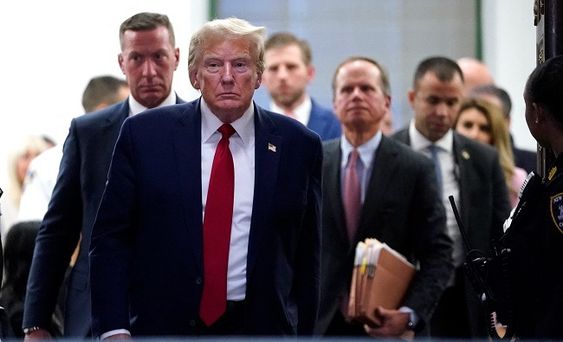World
Request made to Supreme Court to determine if Trump is immune to prosecution

To enable the anticipated trial of former President Donald Trump on allegations of plotting to rig the 2020 election, federal prosecutors requested the US Supreme Court on Monday to make a swift decision regarding his immunity from prosecution.
Special Counsel Jack Smith filed a brief with the nation’s highest court stating, “This case raises a fundamental question at the core of our democracy: whether a former President is absolutely immune from federal prosecution for crimes committed while in office.”
Smith requested the conservative-majority Supreme Court—which is composed of three justices chosen by Trump—for a decision as soon as possible.
“The special counsel stated that the United States acknowledges this as an extraordinary request.” “This case is remarkable.”
“If respondent is not immune, it is paramount that he receive a fair and prompt trial on these charges. It is also of great public importance that respondent’s claims of immunity be resolved as quickly as possible,” Smith stated.
In addition to requesting that Trump’s attorneys respond to the special counsel’s request by December 20, the Supreme Court said it will accelerate its review of Smith’s motion to take up the matter.
Beginning in Washington on March 4, 2024, is the historic trial of the previous Republican president.
A former president has “absolute immunity” and cannot be held accountable for activities he performed while in office, according to Trump’s attorneys, who have continuously attempted to postpone the trial until after the November 2024 election.
On December 1st, US District Judge Tanya Chutkan, who will oversee the first-ever criminal prosecution of a former president, denied the immunity claim.
“The US has only one Chief Executive at a time, and that position does not confer a lifetime ‘get-out-of-jail-free’ pass,” Chutkan stated, regardless of any privileges an incumbent President may have.
“The defendant did not receive the divine right of kings to avoid the criminal accountability that oversees his fellow citizens during his four years of service as Commander in Chief,” the prosecutor continued.
Chutkan’s decision has been appealed to a federal appeals court by the attorneys representing Trump, the front-runner for the Republican presidential candidate in 2024.
Smith is requesting that the matter be taken up by the Supreme Court immediately, circumventing the appeals court.
“The law applies to everyone.” –
No one is above the law, according to Smith’s filing, which is a cornerstone of our constitutional order.
“This case, in which a grand jury has charged a former President with federal offences in an attempt to thwart the orderly transition of power to his duly elected successor, embodies the full force of that principle,” the special counsel stated.
“Holding accountable for criminal conduct any President who manipulates the electoral process to stay in office is the most important thing we can do for our democracy.”
A spokesman for President Trump criticised Smith’s action, stating in a statement that there is “no reason to rush this sham to trial except to injure the President.”
In an interview with AFP, law professor Carl Tobias of the University of Richmond Smith presents “compelling arguments,” but his request is an uncommon one.
According to Tobias, Smith effectively argues that there is a risk to the US’s ability to continue as a functional democracy.
The violent attack by Trump’s supporters on the US Capitol building on January 6, 2021, was the result of a deliberate effort to overturn the results of the November 2020 election, which was won by Democrat Joe Biden. Trump was later charged with these crimes in August.
With his fraudulent assertions that he had won the election, the former president is charged with attempting to deny American citizens their right to vote.
Smith further requested the Supreme Court to rule on whether Trump’s prosecution goes against the prohibition on being tried twice for the same offence, known as double jeopardy, as outlined in the Constitution.
After the assault on the Capitol, Trump was charged with “incitement of insurrection” by the Democratic-majority House of Representatives, but the Senate cleared him.
The nine justices of the Supreme Court will convene again on January 5 to decide whether to take up fresh cases. June is the scheduled end of the current court term.
